Kosovo and Independence from Serbia
In the autumn of 1992 on my way to Istanbul I cycled through Serbia while many Serbs were at war next door in Bosnia and next door again in the Krajina region of Croatia.
It was a strange time to be a tourist, with the world hating the place. This was only weeks after emaciated men behind wire appeared on our screens, and there was an international embargo against the rump Yugoslavia of Serbia and Montenegro.
So the most powerful of the Yugoslav republics was struggling in places even for food; the hotels I stayed in were largely empty; and even changing travelers cheques was next to impossible. In fact at the border they weren’t keen on me entering in the first place. I was determined however as I was escaping the poverty of western Romania and its ensuing dangers.
Everywhere I went in Serbia - and I cycled from the border with Romania north of the Danube down to the southern border with Macedonia - I was greeted with the words “Why you come here? Why are you in Yugoslavia?”
This use of English, and its defensiveness, rendered my Serbo-Croat tourist patter quite useless as I settled for the equally defensive “I’m just passing through, I’m heading to Istanbul” and I would helpfully point in a southerly direction with a degree of urgency that suggested I had only stopped for a boiled phyllo pie and some fruit pulp.
Eventually my replies became “I’m not here. I mean, I didn’t come here; I’m going somewhere else, to Turkey, here is just on the way. To there”.
And all the time it was Yugoslavia that the natives spoke of, never Serbia.
In the north there was a quiet dignity about the Serbs that some people might call dour, but I enjoyed the Serbs and found them funny, even if they were involved in genocide just up the road. And in the north, in the autonomous province of Vojvodina, the familiarity of its Hungarian architecture and minority population were a comfort to me only a short time after a magical trip through Hungary.
As I progressed south the suspicions of the Serbs, while still obvious, did not seem as strong. I wasn’t sure if this might be because I was further away from a politically charged Belgrade, or because as I neared the southern border I clearly really was planning to leave Yugoslavia.
Do you remember the US military briefing to the press by Stormin’ Norman during that 1st Gulf War of what we were told was the luckiest man in Iraq? In black and white film from a plane we were shown a car going across a bridge and through the targetting cross-hairs seconds before a laser-guided bomb destroyed the structure. “And in his rear-view mirror…” as everybody laughed.
Well, when I had left Dublin some weeks before arriving in Serbia, Sir David Owen was trying to persuade NATO, or anyone with air power, to isolate Belgrade by such methods as blowing up the bridges over the Danube. Owen had this knack for crazy military suggestions, once advocating that the British government should construct a wall the entire length of the border between the Republic and Northern Ireland, and scoffing at detractors by claiming Israel would laugh at people who suggested such a plan was impossible.
So as I cycled over the only bridge over the Danube for hundreds of miles east of Belgrade I kept hoping that I wouldn’t be on it at the moment he succeeded in his persuasion. I didn’t want to be the luckiest cyclist in Yugoslavia. I didn’t have a rear-view mirror.
That bridge at Smederevo was ultimately destroyed by a NATO bombing in 1999 during the conflict over Kosovo. (Dunav is Serbian for Danube)
Maybe it’s the whole proximity to the Mediterranean thing, but the Serbs were more outgoing the further south along the Morava valley I went. This was especially noticeable in young women. Or maybe I was especially noticing young women. Whatever the reason, it was easy to forget the military manoeuvres I’d witnessed during the day, when in the evening I was followed around by small groups of women.
Of course this tended to make me giddy, and then I noticed that lots of the men I was meeting on the mountain roads were also very happy and smiling. I guess gangs of women just follow men around in southern Serbia, I told myself. Strangely however, that wasn’t it.
These men weren’t giddy Serbs being chased by women; they were ordinary Albanians. From Kosovo, just a few miles to the west. To a man they made sure I knew they were Albanian from Kosovo, and not Serbs. And they always made sure I knew that their capital was Pristina, though I’m still waiting to cash in on that in a pub quiz. Give or take a deformed nation of Romanians, these Kosovars were the poorest people I’d ever come across. And true to cliches they were the happiest.
Without closely going over old maps now buried somewhere in storage, I can’t tell you for certain if I actually cycled in Kosovo itself. If I didn’t I at least went within 3 miles of its border, but I can tell you that through the many Kosovars I met in southern Serbia and in neighbouring Macedonia, that Kosovo made an impact on me.
I mention all of this of course because of the Kosovo Declaration of Independence, and to declare my prejudices. And because I like to talk about my holidays.
Without even reading very far back into the history of Yugoslavia, by just knowing what happened there during the Second World War, you knew that the wars of the 1990s were going to be horrific. What people had suffered in WWII was in living memory. The simple view of then was that the Croats were the bad guys and Serbs the victims. I suscribe to neither simplistic nonsense.
But Kosovo? Kosovo is the heart. The heart of Serbia. Whether it should or shouldn’t be, that’s how the Serbs feel. You can’t make that go away by waving an Albanian flag. Or an American one. And as much as I like the Kosovars - they were so much easier to like than the Serbs I met - I’m very uneasy about encouraging their independence.
Everybody and his dog is in favour of self-determination. It’s become a basic tenet of democracy, of civilisation. But we still have to draw lines around the land that is exercising self-determination. And nobody and his dog agrees on the lines.
If you draw a line around the six historical counties of Northern Ireland - and somebody did - then what that self determines will be quite different to the self-determination of the people of the island of Ireland as a whole, which is different again to a self-determination exercised by the people of what was once called the United Kingdom of Great Britain and Ireland.
If a part of the US, say southern California, had a majority of people who didn’t consider themselves American - say they considered themselves Mexican - would the world accept the right of that group to secede from the US in recognition of their right to self-determination?
I’m not necessarily against Independence for Kosovo, but I really think the world could have gone slower with this. So what if Kosovo remained in a consitutional limbo? Wthout agreement from Serbia the recognition of independence is an unnecessary risk of war. You don’t need Milosevic to whip up a nationalist fervour; taking Kosovo from Serbia - as they see it - will inflame the ordinary people.
And the last 100 odd years in that land-locked pocket in the mountains has shown us the horrors that ordinary people inflamed can inflict upon each other.

 Eolaí gan Fhéile:
Eolaí gan Fhéile: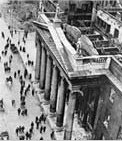


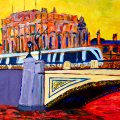
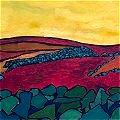
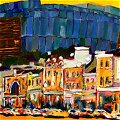
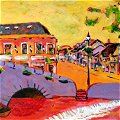
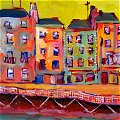

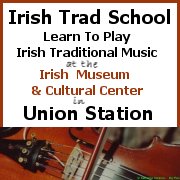


Great insights. Thanks.
Giddy? LOL Woodville is more like it!
I agree, Eolai. In spite of the Serbs’ behaviour in the most recent wars, they have some justification on their side in this. And even if you were prepared to dismiss the substance of their complaints, you’d still have to look at the practicalities.
Kosovo generates the most profound passion among Serbs. Milosevic knew what he was going when he made that speech at Kosovo Polje in 1989, and it worked. If the EU and the USA think this experiment will go off nice and smoothly, they’re wrong. In this case, I think the Russians, Greeks and Spanish are right.
The other thing to watch out for is the KLA, a huge organised crime gang that successfully passed itself off as a freedom movement. Support for an independent Kosovo will create a gigantic conduit for hard drugs to enter Western Europe.
Yes Bock, the practicalities have to be considered because of the serious impact and legacy the decision to recognise the independence will possibly have.
Much of the coverage seems to indicate that Kosovo is like a detached add-on to Serbia in the way that the Soviet Socialst Republics were added on to the Russian Federation to form the USSR, when in reality to Serbs Kosovo is an integral part of Serbia, with the most profound historical significance. It’s not like saying that the Falkland Islands are British; it’s like saying that Munster is Irish.
[via Twitter]
super post